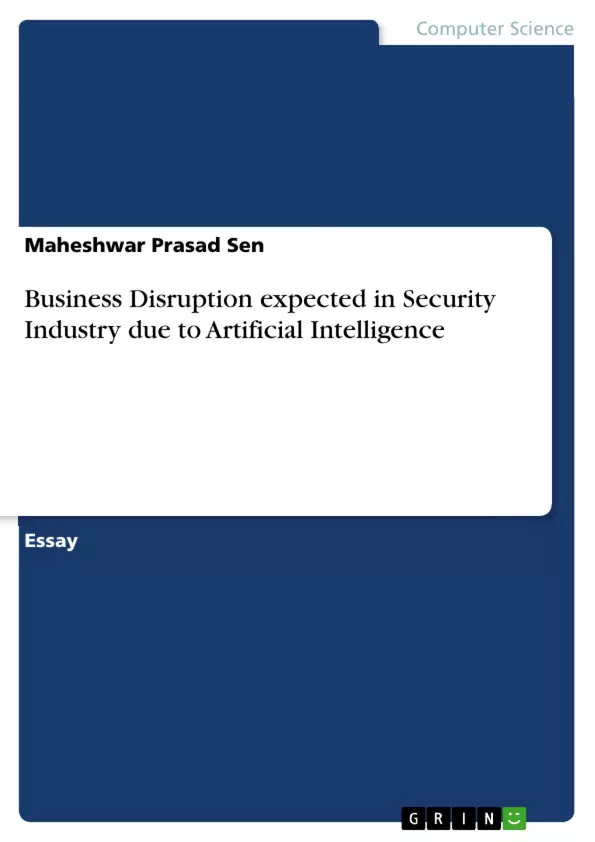There have been rapid changes in the fields of IT in the in last two decades and developments in IT and ITES has disrupted many set industries. The Uber is the largest personal transport services provider specially city taxi services in the world wherein it doesn’t own a single car in its inventory, so is the case of Air BNB which sales hotel space across the world without owning
a single suit of its own. There are some other success stories in India too like Zomato, Foodpanda, OYO and so on. This has happened just because of IT which is disrupting industries at a faster pace than anticipated.
Time is not far wherein security industry may find silent entry of some of the IT giants sooner than later. There is a famous saying that "if you don’t change with time, time will change you." If we (security professionals) fail to read the writings on the wall and embrace the new technologies in the field of Security and continue to believe that technology can’t replace human elements altogether, well, it may be right to some extent, but one will be outsmarted for sure.
Inhaltsverzeichnis (Table of Contents)
- Introduction
- Al and Its Development
- Disruptive Powers of Artificial Intelligence
- Applications and Vulnerabilities
- Conclusion
Zielsetzung und Themenschwerpunkte (Objectives and Key Themes)
This text examines the potential impact of artificial intelligence (AI) on the security industry. It aims to analyze the disruptive capabilities of AI and explore its potential applications, challenges, and vulnerabilities in safeguarding critical infrastructure and assets.
- The rise of AI and its implications for the security business
- The potential for AI to disrupt traditional security practices
- The advantages and disadvantages of AI in the security context
- The role of AI in protecting critical infrastructure and assets
- The ethical and security considerations of AI in the security industry
Zusammenfassung der Kapitel (Chapter Summaries)
- Introduction: This chapter outlines the rapid advancements in IT and their impact on various industries, including the security sector. It highlights the potential for AI to revolutionize security practices and discusses the need for security professionals to adapt to these changes.
- Al and Its Development: This chapter provides an overview of AI, tracing its origins and evolution. It discusses the capabilities of AI machines, their potential for performing tasks traditionally done by humans, and the implications of AI for the future of labor.
- Disruptive Powers of Artificial Intelligence: This chapter explores the disruptive power of AI across various sectors, highlighting its ability to challenge human intelligence and expertise. It discusses the speed of AI development, its impact on fields like chess and healthcare, and the potential for AI to surpass human intelligence in the future.
- Applications and Vulnerabilities: This chapter delves into the potential applications of AI in the security sector, including enhanced monitoring capabilities, automated response systems, and the use of robots for surveillance and personal protection. It also examines the vulnerabilities of AI-based systems to cyberattacks and the potential risks associated with AI malfunction or misuse.
Schlüsselwörter (Keywords)
Key words and focus topics include artificial intelligence, security industry, disruptive technologies, critical infrastructure, cyberattacks, robotics, automated systems, surveillance, human intelligence, machine learning, and ethics.
Frequently Asked Questions
How is AI disrupting the security industry?
AI is automating surveillance, enabling predictive threat analysis, and introducing robotic security elements that can replace or augment traditional human-guarding roles.
Can technology completely replace human security guards?
While technology may not replace the human element entirely, security professionals who fail to adapt to AI-driven tools will likely be outsmarted and outcompeted in the market.
What are the vulnerabilities of AI-based security systems?
AI systems are susceptible to cyberattacks, software malfunctions, and ethical dilemmas regarding privacy and automated decision-making in critical situations.
What are the advantages of AI in protecting critical infrastructure?
AI offers 24/7 monitoring without fatigue, faster response times to breaches, and the ability to process vast amounts of data to identify subtle security patterns.
What is meant by "silent entry of IT giants" in security?
It refers to tech companies leveraging their data and AI expertise to offer security solutions, potentially displacing traditional security firms that rely solely on manpower.
- Arbeit zitieren
- Dr. Maheshwar Prasad Sen (Autor:in), 2019, Business Disruption expected in Security Industry due to Artificial Intelligence, München, GRIN Verlag, https://www.hausarbeiten.de/document/491475


